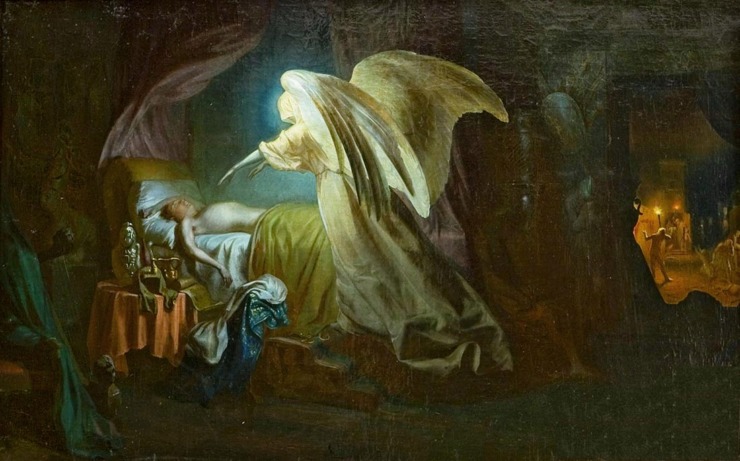The Man Who Dreamed of Faeryland
He stood among a crowd at Drumahair;
His heart hung all upon a silken dress,
And he had known at last some tenderness,
Before earth made of him her sleepy care;
But when a man poured fish into a pile,
It seemed they raised their little silver heads,
And sang how day a Druid twilight sheds
Upon a dim, green, well-beloved isle,
Where people love beside star-laden seas;
How Time may never mar their faery vows
Under the woven roofs of quicken boughs:
The singing shook him out of his new ease.
He wandered by the sands of Lisadill;
His mind ran all on money cares and fears,
And he had known at last some prudent years
Before they heaped his grave under the hill;
But while he passed before a plashy place,
A lug-worm with its gray and muddy mouth
Sang how somewhere to north or west or south
There dwelt a gay, exulting, gentle race;
And how beneath those three times blessed skies
A Danaan fruitage makes a shower of moons,
And as it falls awakens leafy tunes:
And at that singing he was no more wise.
He mused beside the well of Scanavin,
He mused upon his mockers: without fail
His sudden vengeance were a country tale,
Now that deep earth has drunk his body in;
But one small knot-grass growing by the pool
Told where, ah, little, all-unneeded voice!
Old Silence bids a lonely folk rejoice,
And chaplet their calm brows with leafage cool,
And how, when fades the sea-strewn rose of day,
A gentle feeling wraps them like a fleece,
And all their trouble dies into its peace:
The tale drove his fine angry mood away.
He slept under the hill of Lugnagall;
And might have known at last unhaunted sleep
Under that cold and vapour-turbaned steep,
Now that old earth had taken man and all:
Were not the worms that spired about his bones
A-telling with their low and reedy cry,
Of how God leans His hands out of the sky,
To bless that isle with honey in His tones;
That none may feel the power of squall and wave
And no one any leaf-crowned dancer miss
Until He burn up Nature with a kiss:
The man has found no comfort in the grave.
-WB Yeats
Enjoy Artistic Representations of “The Man Who Dreamed of Faeryland” by WB Yeats

Tha Angel of Death by Ilya Repin, 1865.

The Cemetery Entrance by Caspar David Friedrich, 1825.
Listen to this Reading of “The Man Who Dreamed of Faeryland”
Listen to this Musical Interpretation of “The Man Who Dreamed of Faeryland” by WB Yeats
About W.B. Yeats
William Butler Yeats was born in 1865 in Dublin into a family of the Protestant Anglo-Irish landowning class. He lived in Dublin and London during his growing up years. He was very much affected by the politics of the time, as he was a young adult when the protestant minority in power began to be displaced by the predominantly Catholic nationalist movement.
Yeats studied law for a time but eventually moved to London to study art. He was an accomplished playwright, and a founder of the Irish Theatre which was later to become the Abbey Theatre. While he is better known for his poetry, Yeats was awarded the Nobel Prize for Literature in 1923 more for his theatrical works than his verse. He was the first Irishman to be awarded the prize.
His first collection of poems was published in 1889, and there is strong evidence of the influence of Edmund Spenser and Percy Bysshe Shelley. Later, his poetry became more rooted in realism and the physical, with influence of Ezra Pound and William Blake apparent. Common themes in his poetry include mysticism, spiritualism, the occult and Irish identity and nationalism.
Yeats was appointed to the Irish senate in 1922. He was married, but had an ongoing relationship of sorts with a former love, Irish activist and revolutionary Maud Gonne. Known as one of the greatest poets of the 20th century, Yeats died in 1939.
That’s it for The Man Who Dreamed of Faeryland!
BUY ‘HOW TO WRITE A FORM POEM’ NOW!
